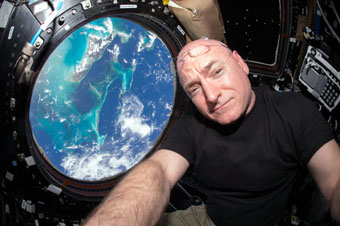
A New Record for Time in Space
| published October 16, 2015 |
By Thursday Review staff
NASA astronaut Scott Kelly just broke a significant U.S. record. As of early this morning Kelly has become the American to have spent the most cumulative time in space, breaking the previous benchmark set by astronaut Mike Fincke. As of today (Friday, October 16), Kelly has spent 383 days living in orbit above the Earth. Fincke’s record was 382 days.
Then, in less than two weeks, Kelly will break a second record: 216 continuous, uninterrupted days in space. On October 29 Kelly will surpass Michael Lopez-Alegria’s record of 215 consecutive days above the Earth.
Kelly now gets to pad his record with each passing day as part of his planned mission of one year in space. Kelly, along with Russian cosmonaut Mikael Kornienko, is part of long-term testing of human in space—medical, biological and mental conditions which NASA and other international space agencies will need to understand in preparation for long-duration voyages to Mars, the Asteroid Belt, and beyond.
Scientists and doctors and monitoring Kelly and Kornienko for changes in memory, motor skills, cardiovascular function, muscle mass, bone density, and cellular repair, and blood chemistry. Scientists also want to understand the effects of weightlessness and solar radiation on the human body.
Kelly’s participation is also unique in that NASA can compare and contrast changes in his body with those of his twin brother, astronaut Mark Kelly. The study of the differences between the twins will help a hundreds of researchers and scientists in the academic and government world better understand exactly how humans change and adapt to life in space for extremely long journeys. Among the factors being monitored: changes to DNA and genetic sequencing, and adaptations in the way the brain operates. NASA also wants to understand how the irregular cycles of light and dark, daylight and nighttime affect both sleep patterns and motor skills.
Space travel from Earth to Mars could take as much as one year, though NASA hopes to make the voyage in a shorter time span. At any rate, for humans to gain sufficient useful knowledge of Mars, a manned-expedition would ideally include several weeks—if not longer—on the Martian surface. A return trip to Earth would also likely take many months or even one year. Kelly’s long-duration stay aboard the International Space Station is the first of many steps toward understanding how humans would adapt to interplanetary travel.
If all goes as planned, Kelly will return to Earth on March 3, 2016, at which time he will have completed more than 500 consecutive days in space.
Related Thursday Review articles:
Biomedical Experiments in Space; Keith H. Roberts; Thursday Review; August 6, 2015.
Space Station: A Close Call With Space Junk; Thursday Review staff; Thursday Review; July 17, 2015.
